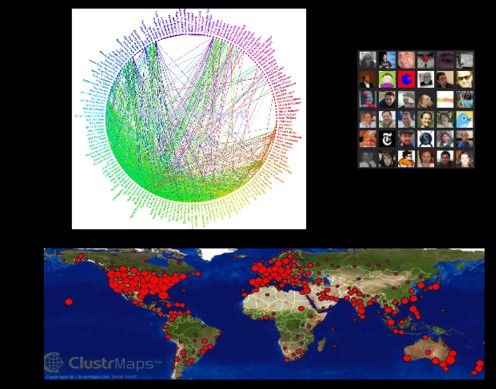The last couple of days have been very interesting. I’d like to share what I have learned since I shared on this blog a discussion about favouring an external blog to an internal one.
Above all, I learned that I could depend on the people in my network. Who are these people? Some of them I’ve met face to face; some I’ve come to know through my involvement in online networks; a few I’ve only just met in the course of this blog issue.
Amazingly, over 200 people read my last blog post. Much as I’d like to convince you otherwise, I don’t normally record such a readership. How did I receive such a response?
After writing out my response to the Computer Systems Manager, then posting this with my response to him, I sent a link to the post out on Twitter, asking for people to enter into the discussion. I wanted to generate discussion, and to collect people’s views and perspectives. Discussion is a healthy and powerful thing. It’s a good idea to find out what others think even if they don’t agree with you, and in some cases, particularly when they don’t agree with you, since it pushes your thinking.
Apart from clarifying my own thinking with regard to the value of Web 2.0 technologies and their role in learning and teaching, in writing out this issue I gained valuable insights from others using the Web 2.0 platforms. Herein lies the power of these technologies – not in the technology itself, but in the powerful connections with people, people with unique backgrounds, experiences, qualifications, talents, and ideas.
The people who commented my post were educators or involved in education in some way. They responded quickly, and they came from around Australia (Melbourne, Sydney, Brisbane, Canberra and Perth) and overseas (Hong Kong and USA). Click on their names next to the comments and read their profiles and their blogs to make their acquaintance.
My online networks are full of professionals whose reading and links, ideas and talents, I follow. If I need an idea, advice, professional reading, teaching material, and more, I go to this network. And I try to be helpful in return. Anyone who has experienced the collective wisdom of online networks will tell you the same. It is not about the technology.
Our students will go into the world needing support and continued learning. If we help them understand and navigate appropriate networks, we will be laying the foundations for support systems. We should allow them to learn within supervised online environments, teaching them how to write and interact appropriately and in a safe way, to share ideas and solve problems with relevant groups of people, etc.
As educators, our view of what is essential for student learning needs to change. Our students’ world will be fast-paced and changeable, requiring adaptability and resourcefulness. Our students will need to know how to find what they need, and who to trust. They will hopefully be able to discern who to follow and how to behave.
Change is never easy. One of my mentors, and co-founder (with Will Richardson) of the Powerful Learning Practice model, Sheryl Nussbaum-Beach, has just written a blog post about change, which she prefaces with the following quotations:
“It’s not that some people have willpower and some don’t. It’s that some people are ready to change and others are not.” James Gordon, M.D.
“Change has a considerable psychological impact on the human mind. To the fearful it is threatening because it means that things may get worse. To the hopeful it is encouraging because things may get better. To the confident it is inspiring because the challenge exists to make things better.” King Whitney Jr.
Sheryl uses the metaphor of her recent house renovation to deconstruct the journey towards building change, towards the creation of something new. She documents this process insightfully, and I recommend you read the entire post. I thought I’d pull out some of the phrases that resonated with me in Sheryl’s post. She talked about the challenge of
keeping the momentum and the dream of the transformation alive
She also said:
There are times I wanted to throw in the towel and thought as outdated as the home was at least there was peace and comfort.
things will look worse before they get better
Fear is a big part of it too
Trust is another issue. Do the experts I have hired to make these changes a reality have the know how and wisdom to make it all happen
I’d like to end my post with another one of Sheryl’s quotes:
For change to take hold and redefine people and the places they live and grow there needs to be a time of inquiry, reflection, and visioning.
I’m grateful that I have people with whom to share my inquiry, reflection and visioning.








